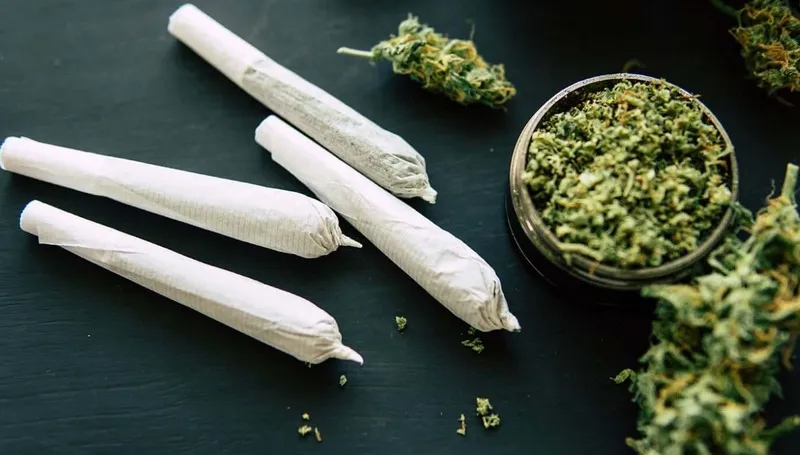If you’re concerned about someone you care about using marijuana, knowing the signs of abuse is the first step toward figuring it out. The following are some of the most frequent indicators and symptoms of Marijuana use:
- Bloodshot eyes
- Increased appetite
- Lack of motivation
- Weight gain
- Nervous or paranoid behavior
- Impaired coordination
- Slowed reaction time
- Dry mouth
- Memory impairment
- Anxiety
- Impaired judgment
- Distorted perception
- Relaxed state/sleepiness
- Feeling “high” or euphoric
However, it is also critical never to diagnose yourself or a loved one without first consulting a medical expert. To acquire more information, contact a treatment business and inquire about their services.
Marijuana Abuse Statistics
More than 100 million Americans have used marijuana at least once in their lives, with 25 million doing so in the previous year, according to experts. According to study, approximately two million people in the United States try marijuana for the first time each year.
From 2001 to 2010, roughly 7 million Americans were arrested for marijuana-related offenses. Marijuana use was a contributing factor in more than 450,000 visits to emergency rooms or urgent care facilities, according to the Drug Abuse Warning Network (DAWN).
On a worldwide scale, the United Nations predicts that over 155 million people (or about 3.5% of the planet’s population) use cannabis at least once a year.
The Dangers Of Marijuana
Many Americans are fine with Marijuana use, to some extent. Many individuals in the United States are tolerant of Marijuana usage. While state governments have legalized the distribution and consumption of the substance for both medicinal and recreational purposes, it is also true that just because something is legal does not imply it is safe.
The psychological impacts of long-term Marijuana use are still being studied, and additional study is needed. According to some research, Cannabis use can induce dependence and eventual addiction, raising the risk of developing mental illnesses including depression, anxiety, motivational disorder, and schizophrenia. Medical marijuana doctors may give patients cannabis to manage or reduce the effects of severe or chronic pain, arthritis, or cancer therapy-induced nausea and vomiting. It can be tough to draw firm conclusions because there isn’t enough evidence or research at this time.
It’s critical to talk about both the dangers and potential benefits of marijuana use, especially as more states legalize it for medical or recreational reasons.
Following cannabis usage, short-term memory and the senses may be altered for a time period; the long-term effects are less clear and require further study.
One of the most prevalent worries is when an individual first started using marijuana. While there is still a lot that scientists don’t know, studies have shown a link between adolescent marijuana use and long-term long-term mental impairments such as lower IQ points.
Signs Someone Is High
Red eyes, poor muscle control, delayed reaction times, and an increase in hunger are all signs of marijuana use. A dramatic change in mood from tense to relaxed might indicate marijuana usage, as could abrupt symptoms of anxiety, panic, or hallucinations. Marijuana has a distinct odor that may be likened to skunk perfume. Catching a whiff of this fragrance on someone’s clothing or hair can also be an indication that they have recently used the drug.
Individuals who are high on marijuana may go unnoticed at home, at work, or in other locations where sobriety is the norm. People who observe a change in someone may subsequently doubt their initial judgment. People can attribute worrisome action to tiredness, sickness, or even just a bad mood as part of this process of doubting.
Break the Cycle of Addiction
If you observe any of these qualities in a person close to you, it’s critical that you offer assistance and support. Encouraging someone you care about to acknowledge that they have an issue is one thing you can do to help them. Then contact our caring team at Michael’s House for assistance.
Michael’s House provides mental health treatment for children and families dealing with issues like drug abuse, depression, anxiety, and trauma. Our programs at Michael’s House help individuals overcome their marijuana addictions by teaching them new ways to think about themselves and live their lives. They will leave therapy knowing how to live a healthy life free of drugs. Marijuana Abuse Causes and Risk Factors.
Several genetic and environmental factors have been linked to a person’s likelihood of using or becoming dependent on marijuana.
Genetic: Individuals who had a parent or sibling who had a substance use problem were found to be far more likely to develop an addiction than those whose family history did not include addiction. As researchers have been able to gather greater genetic information as a result of technological advancements, up to 266 genes have been linked with whether or not someone is predisposed to drug abuse and dependency.
Environmental: While genetics and environment both play a role, family history may also be involved. Individuals from homes where marijuana usage is common are much more likely to do so than are people whose parents prohibited recreational substance abuse. Living in poverty, long-term exposure to stress, experiencing trauma, and associating with friends or coworkers who use drugs are additional environmental influences that can increase a person’s chance of indulging in marijuana abuse.
Risk Factors:
- Age (most people who abuse marijuana first do so before age 30)
- Family history of substance abuse and addiction
- Personal or family history of mental illness
- Prior abuse of other substances
- Personal history of abuse, assault, or other trauma
- Poor stress-management capabilities
- Early exposure to substance abuse


